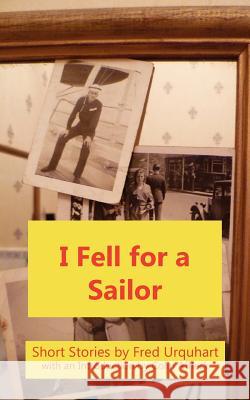I Fell for a Sailor » książka
I Fell for a Sailor
ISBN-13: 9781849210775 / Angielski / Miękka / 2011 / 266 str.
Originally published in 1940, Fred Urquhart's first collection of short stories brings to life the modern Scotland of the 1930s, using his inimitably vivid dialogue. He shows the struggles of working-class women, whether labouring in a sweatshop, facing death in a tuberculosis hospital or seeking escape on a bike of her own. His male characters also have problems, caused by army life, religion or homosexuality in a period of oppression. Life is sometimes overshadowed by the approach of war. But there is comedy too, for example a fraught day at Glasgow's Empire Exhibition of 1938. And Urquhart looks beyond Scotland, with the story of a young American woman and her sailor, a sketch of an Italian soldier in the Spanish Civil War and a comic tale of a film director in Hell.Fred Urquhart (1912-1995) was born in Edinburgh and spent much of his childhood there, where his grandparents lived, and later he worked in an Edinburgh book shop for some years ('my university'). He is best known as a superb short story writer. When he began to write it was the heyday of short story magazines, and this was the only obvious way to earn a living as an author. He spent the war in the north-east of Scotland, a conscientious objector relegated to farm work: his stories of this are agreed to rival Grassic Gibbon and Jessie Kesson. But later he went to London, finding the louche world of Soho more to his taste than Edinburgh correctness. Later he lived in the country in a 'happy homosexual marriage' and he did not return to Scotland until 1991, after his partner's death. The Ferret Was Abraham's Daughter (1949) and Jezebel's Dust (1951) are his two great novels of Edinburgh's poorer citizens in wartime.Having admired Fred Urquhart's work for many years, Colin Affleck, a fellow native of Edinburgh, became a friend of his on his return to Scotland in 1991. Urquhart later appointed him as his literary executor. Among Dr Affleck's writings on Urquhart is a study focussing on his short stories, which appeared in British Short-Fiction Writers, 1945-1980 (edited by Dean Baldwin). Dr Affleck is now working on a biography of Urquhart.
Originally published in 1940, Fred Urquharts first collection of short stories brings to life the modern Scotland of the 1930s, using his inimitably vivid dialogue. He shows the struggles of working-class women, whether labouring in a sweatshop, facing death in a tuberculosis hospital or seeking escape on a bike of her own. His male characters also have problems, caused by army life, religion or homosexuality in a period of oppression. Life is sometimes overshadowed by the approach of war. But there is comedy too, for example a fraught day at Glasgows Empire Exhibition of 1938. And Urquhart looks beyond Scotland, with the story of a young American woman and her sailor, a sketch of an Italian soldier in the Spanish Civil War and a comic tale of a film director in Hell.Fred Urquhart (1912-1995) was born in Edinburgh and spent much of his childhood there, where his grandparents lived, and later he worked in an Edinburgh book shop for some years (my university). He is best known as a superb short story writer. When he began to write it was the heyday of short story magazines, and this was the only obvious way to earn a living as an author. He spent the war in the north-east of Scotland, a conscientious objector relegated to farm work: his stories of this are agreed to rival Grassic Gibbon and Jessie Kesson. But later he went to London, finding the louche world of Soho more to his taste than Edinburgh correctness. Later he lived in the country in a happy homosexual marriage and he did not return to Scotland until 1991, after his partners death. The Ferret Was Abrahams Daughter (1949) and Jezebels Dust (1951) are his two great novels of Edinburghs poorer citizens in wartime.Having admired Fred Urquharts work for many years, Colin Affleck, a fellow native of Edinburgh, became a friend of his on his return to Scotland in 1991. Urquhart later appointed him as his literary executor. Among Dr Afflecks writings on Urquhart is a study focussing on his short stories, which appeared in British Short-Fiction Writers, 1945-1980 (edited by Dean Baldwin). Dr Affleck is now working on a biography of Urquhart.











